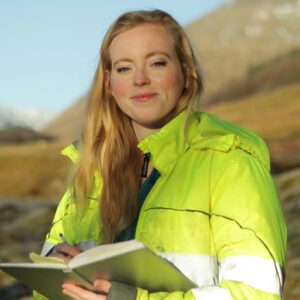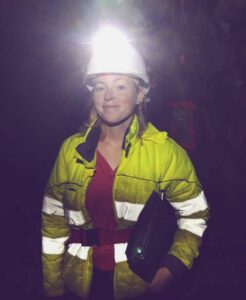“I think the perception around mining is becoming more positive as we prove that it can (and should) be undertaken with the highest environmental standards in mind.”
March 2021
Charlie King graduated from the University of Southampton with an MSci degree in Geology and joined Scotgold Resources in 2018, getting involved in all aspects of the Grampian exploration project and Cononish mine development. She continues to search for gold and silver in the Grampian Terrane of Scotland as an exploration geologist.
By Kathy Sole
-
What attracted you to geology? Why did you choose a career in the mining industry?
I have always had a keen interest in science, practical work, and being outside, so choosing to study a degree in geology seemed like the perfect fit! During my time studying, it became apparent that the subject allows for far-reaching and varied career opportunities. After completing a Masters research project that investigated the geochemical behaviour of gold, I was captivated by the idea of a career in exploration.
-
Please describe your current role(s).
Currently, I am the Senior Exploration Geologist for Scotgold. My work mainly includes planning, budgeting, and then executing both near-mine and regional exploration programmes. I collect samples in the field, complete geological mapping, and analyse geochemical, geophysical, and structural data sets with the aim of developing drill targets to ultimately define new resources. I also complete underground face mapping at the Cononish Mine, give geological advice to the mine team regarding mining direction, and take samples at the face for grade-control purposes. I’m very busy but I do love the variety!
-
Scotland is not well-known as a mining region. Please tell us more about the economic importance of mining to your country.
Recently, there has been a resurgence in both exploration and mining within Scotland and the United Kingdom as whole, with several projects making swift progress towards production. The Grampian terrane in Scotland has proved to be highly prospective for gold and other metals, therefore the rising price of metals, coupled with the political stability of the UK, makes it an attractive option for exploration companies. The industry provides well-paid, skilled job opportunities to local people, as well as much-needed raw materials that are essential to many different economic sectors. The Cononish gold mine is small compared to other mines globally but has provided work for more than 50 people in a rural area that is usually reliant on tourism and has been struggling to stay afloat during the pandemic. I think the perception around mining is also becoming more positive as we prove that it can (and should) be undertaken with the highest environmental standards in mind.
-
What are you most proud of having achieved in your career so far?
I’m proud to have been part of the team behind Scotland’s first gold mine. When I first came to the company, it had just secured all the planning and funding required, so a lot of the work was just getting started. There had also been a hiatus of exploration work so setting up the department was incredibly challenging, but after a lot of hard work and perseverance I can now look back and say I am proud to have been a part of it!
-
What are you passionate about in your work and find most rewarding?
I’m very passionate about the exploration work here in Scotland. It is such a beautiful part of the world with such interesting geology and that makes getting out there to complete fieldwork gratifying (when the weather isn’t too bad!). I then get great satisfaction out of analysing and collating the different datasets to start building up an interpretation of what is going on beneath our feet. Often the more you find out about an area, the more questions tend to arise, but that’s all part and parcel of being a scientist!
-
What is your experience of being a woman working in the mining sector? Do you feel you have had to adapt to ‘fit’ the industry? What has been your most significant challenge?
I have had occasional, strange comment about the way I look or being asked if I ‘get scared’ being underground, but generally, I think I have had a positive experience so far. I am especially grateful for the respect I’ve always been shown by my managers. Working in this environment can be challenging and I think most people will have to adapt in some way, however small—although finding comfortable and well-fitting PPE has been a bit of a challenge!
-
What is your next or ultimate career goal? What would you love to do one day?
I’d like for my work to have made a significant contribution to increasing the reserves of the Cononish deposit as well as finding the next potential mine in Scotland. Following that, I’d love the opportunity to expand my horizons by working on a few different projects around the world in different geological settings.
-
Do you believe women in mining groups can help to change the image of the industry and make the sector more attractive to women and youngsters – both boys and girls?
I think these groups are important because they shine a light on the intelligent and successful women working in the industry and give younger women role models to look up to. I’ve found that seeing and reading about women in these higher positions has allowed me to picture myself one day in their place.
-
Do you have any advice to young women starting out in their studies or careers in this field?
I think I would advise to research all the possible fields relating to the industry as there could be something that suits you perfectly which you never knew existed. Only when starting out in the industry did I realise how many different opportunities there were away from exploration and mine geology, including mine engineering, surveying, and metallurgy.
-
Have you any hobbies, pastimes, or secret talents that you would like to tell us about?
I love flying my hang glider and compete in hang-gliding competitions when I can – it’s the perfect way to explore some of Europe’s most beautiful mountains as well as being a very sociable sport.


